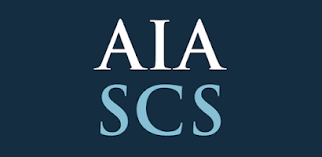SCS/AIA 2025 news!

More conference planning news and opportunities for participation at the Annual Meeting, January 2-5, 2025 in Philadephia, PA.
Here are some updates regarding the two panels at the 2025 SCS/AIA annual meetings. At SCS, we are sponsoring a panel, entitled "The Gods are Watching: The Ocular and the Oracular in Ancient Mediterranean Religions."
CfP: Visuals at religious sites and imaginary ones practically everywhere were a key part of religious experience in the ancient world. But the gods themselves were also perceived as capable of sight and of sharing divine religious knowledge in visual formats, such as in dreams. How did these visual dynamics shape the experience of the divine, both in religious practices and in literary and visual representations? For this panel, we invite papers on any topic related to ideas and practices of visuality in relation to the divine world. Topics might involve: divine surveillance and omnivision, oracular and divinatory processes involving visuals, visual approaches to share divine knowledge, ecphrasis in relation to the divine, the spectacular in association with divine figures, the importance of the gaze when encountering the divine, visibility and invisibility as divine tools, lines of sight including divine images or perspectives.
Please send abstracts for a 15-20 minute paper by March 22, 2024 to Zsuzsa Varhelyi (varhelyi@bu.edu), preferably with the subject heading “abstract_SCS2025.” Abstracts should be 500 words or fewer (excluding bibliography) and should follow the guidelines for individual abstracts (see the SCS Guidelines for Authors of Abstracts). The abstracts will be judged anonymously, and so should not reveal the author’s name, but the email should provide name, abstract title, and affiliation. Decisions will be communicated to the abstracts’ authors by the end of March, with enough time that those whose abstracts are not chosen can participate in the individual abstract submission process for the upcoming SCS meeting.
At the AIA, we are co-sponsoring a panel with Katie Rask (OSU) & Matt McCarty (UBC) entitled "Work and Worship in the Ancient Mediterranean."
CfP: This session fills a substantial gap in studies of ancient culture by modeling the relationships among labour, religion, and social power in the ancient Mediterranean, drawing on interdisciplinary approaches (from archaeology, anthropology, economics, and religious studies) and bodies of material (material, iconographic, and textual). The goal is to challenge and investigate both the oft-repeated Polanyian notion that religion and economy were “embedded” in precapitalist societies, and the very categories of “religion” and “work” which, we contend, have been constructed and held separate due to particular capitalist and colonialist ways of conceptualizing the past. The session responds directly to a recent interest in labour and professionalism in antiquity, as well as a focus on understanding cult as “lived religion.” In the former, focus is often on articulating the boundaries of “work,” or exposing the disjunction between elite denigrations of banausic labour and sub-elite (“middle class”?) celebrations of identity-through-labour; “religion” is almost never mentioned in this body of scholarship. Similarly, “lived religion” approaches see religion as a set of interlocking, improvised, and individuating acts that run through the “practice of the everyday,” but only rarely do “Lived Ancient Religion” studies (in contrast to “lived religion”) explicitly think about labour. But the “everyday” cannot be conceived without recognizing those productive tasks that occupied the vast majority of an individual’s time.
The papers in this session seek a path forward by thinking about both labour and religion as material practices in-the-world, with numerous lived, experienced, and potential linkages—a model that may be particularly helpful in the ancient Mediterranean, as accounts move from speaking of “religion” to active worship. Both work and worship involve the production of value and the transformation of material, social, and imagined worlds in ways that have entailments for the structuration of society. More specifically, the questions we pose include:
- how are practices that we often distinguish as “religion” and “labour” entangled, mutually constitutive, or conflicting in ancient Mediterranean societies?
- how do discrepant social statuses or identities (legal, gendered, ethnic, or racialized) impact practices and discourses on labour and religion in both antiquity and today?
- how do particular discursive and practical configurations of worship and work create the distinctive social patterns of ancient Mediterranean groups?
The panel organizers welcome submissions that engage with these, or related, questions at the intersection of work and worship. We ask for submissions of 300 words (excluding title) by March 15, 2024. Questions about the panel and submissions may be sent to matthew.mccarty@ubc.ca and rask.4@osu.edu. We especially welcome submissions from students and junior scholars, and those who bring diverse lived experience to bear on their understandings of antiquity.
Per AIA policy, please consider the following when submitting your abstract; abstracts must include clear statements concerning the following issues (not necessarily in this order) that help to summarize your research:
- The research problem addressed
- Significance of the research (topic, methodology, or outcomes)
- Goals of the study
- Sources of evidence / data used in the study
- Research / analytical methods
- Conclusions of the study: please note that abstracts that do not include conclusions or outcomes of the research will not be accepted.
Please spread the word widely!
Zsuzsa Várhelyi
* * *
This call for papers has expired.


